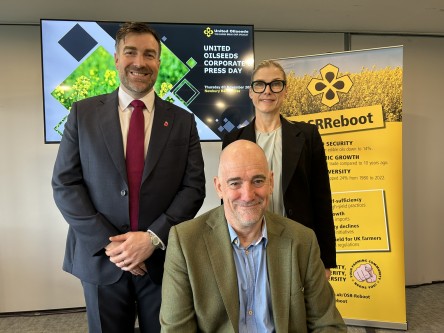
Strong Annual Performance, Clear Call for Fairer Policy
United Oilseeds welcomed supply-chain partners to Newbury recently for its annual Corporate and Press Day, where Managing Director James Warner announced the cooperative’s financial results for 2024–25. Despite a significantly smaller national crop and reduced turnover, United Oilseeds reported a profit of £1.2 million.
Reflecting on the results, Mr Warner said: “Once again, the team have delivered exceptionally well, demonstrating resilience and focus in what has been a difficult trading environment. Despite the well-documented pressures within the oilseeds sector, United Oilseeds has strengthened its financial position. These results highlight our ability to adapt to shifting market conditions while continuing to deliver value for our members and building a platform for sustainable growth.”
Alongside the announcement, James highlighted the power of collaboration across the industry – referencing the remarkable response to the OSR Reboot campaign – and called for fairer policy support for UK growers.
Attendees also heard from AHDB’s Cereals & Oilseeds Sector Director, Sarah Woolford, who outlined the new £750k CSFB funding programme and emphasised the importance of industry-wide knowledge exchange. Tim Parton, regenerative farming advocate and manager at Brewood Park Farm, shared how a deeper understanding of soil biology has enabled him to produce healthy, profitable crops with minimal inputs.
The event repeatedly returned to one core theme: the resilience of UK growers and the urgent need for policy that supports – rather than undermines – their competitiveness.
Offshoring Our Environmental Footprint – and Undermining UK Farmers
Through the OSR Reboot initiative, United Oilseeds continues to advocate for policies that support the sustainable recovery of UK oilseed rape. As James noted, OSR remains central to healthy rotations, pollinator support, homegrown protein supply and domestic food and feed security.
Yet more than a decade of government decisions has weakened the UK’s position. The cumulative impact of policy choices – from the neonicotinoid ban (while imports of treated seed continue), to SFI options that remove productive land, escalating energy and employment costs, and the forthcoming CBAM nitrogen tax – is placing unsustainable pressure on UK growers.
The nitrogen tax alone risks pushing UK fertiliser and production costs far beyond those of our competitors, only for the UK to import OSR from places such as Australia, along with the associated transport emissions.
James also cited the rapid expansion of OSR production in Brazil: “While productive UK land is being taken out of rotation in the name of stewardship, countries like Brazil have quadrupled their OSR area in just five years. Yet Brazilian yields – and yields elsewhere – are often half those of the UK. For every hectare we remove here, two must be cultivated elsewhere to produce the same volume. It’s a perverse outcome that drives deforestation, harms the UK economy and undermines the very environmental goals government says it wants to protect.”
These decisions do not build resilience; they erode it. They discourage investment, restrict growth, increase food price inflation and jeopardise the future of UK OSR production.
As James stated: “These policies don’t reduce environmental impact – they simply offshore it, and in many cases make it worse. The result is an increasingly unlevel playing field for our farmers, who are being asked to meet world-leading standards while competing with imports that face none of the same restrictions.”
A Call for Coherent, Evidence-Based Policy
UK growers continue to show remarkable adaptability and determination, but goodwill alone cannot compensate for structural disadvantage. United Oilseeds is calling for fair, evidence-based policy that rewards sustainable production and allows farmers to compete on equal terms.
Unless government acts decisively to level the playing field, the UK risks further undermining the ability to produce oilseed rape domestically, forcing greater reliance on imports and exporting our environmental footprint in the process.
James closed with a clear message:
“At United Oilseeds, we will continue to speak up for our members and push for sensible, joined-up policy that enables farmers to grow OSR confidently, profitably and sustainably. We’ve already shown through the OSR Reboot what’s possible when the industry pulls together – now it’s time for government to do its part.”
